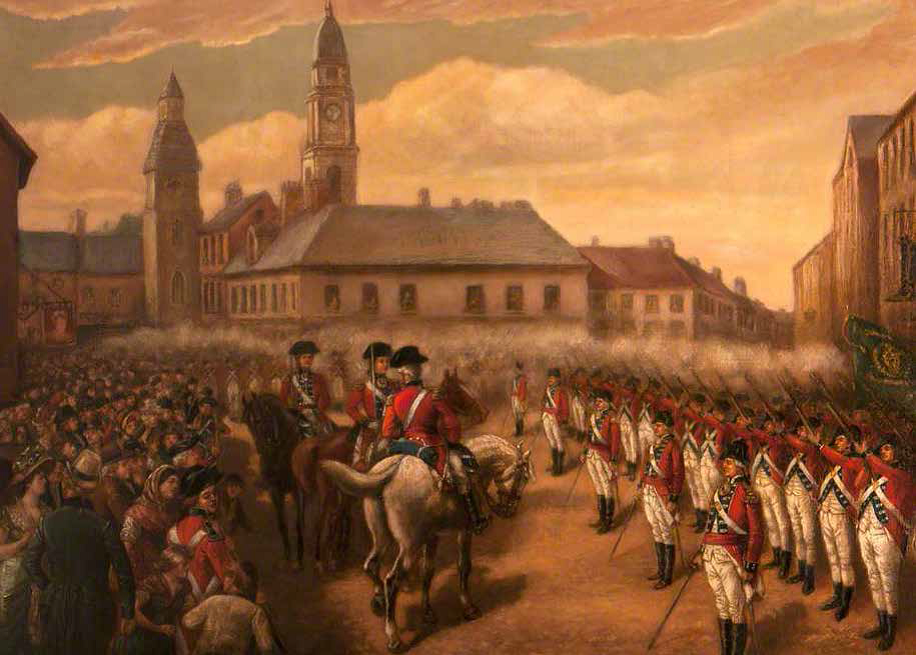
Historian Christopher Loughlin outlines the life and times of William Todd Jones, Esquire, of Lisburn.
William Todd Jones, Esquire, radical Patriot MP fir Kisburn from 1783 to 1790, was the first anti-sectarian politician elected in Ireland’s history. His position was not just tolerance of Catholics, but emancipation from penal statute. In late eighteenth-century Ireland, however, the ruling Anglo-Irish elite feared what impact the end of the ‘Penal Laws’ would have for their political and economic power. In the renewed, reforming, and radical atmosphere of the 1790s, a result of the epoch-changing French Revolution of 1789, Jones’ position became accepted and propagated by the United Irishmen. However, the story of Ireland’s first anti-sectarian politician, William Todd Jones, is not well known, despite his acquaintance with the leading radicals of his day including Dr. William Drennan, Joseph Pollock and Theobald Wolfe Tone.
The Rise of the Patriot Volunteer
William Todd Jones was born in the small market town of Lisburn, County Antrim, in 1757, the son of Doctor Conway Jones and his wife Mary (née Todd). They were an established Anglican Church of Ireland household, a prosperous family with some independent wealth and were related to the famous Belfast merchant family of Valentine Jones. In mid-eighteenth century Ireland there was an increasing demand for medical services, education, consumer goods and religion. The Todd Jones family were part of this expanding Irish and Atlantic economy, which fuelled an Irish ‘bourgeois revolution’ and the leap into modernity.
In 1776, William Todd Jones arrived in Dublin, to be trained as a lawyer; the same year the American colonies rebelled against British colonial rule. The Americans chafed at the arbitrary government, economic restriction, and control exercised from London. Intellectuals and dignitaries in Ireland spoke out in favour of America and the American genius, Ben Franklin, issued a special appeal from America to Ireland in 1778. As the British position in North America worsened The Irish Volunteer movement was launched in 1778. The original purpose of this overwhelmingly Protestant organisation was to guard against invasion and to preserve law and order at a time when British soldiers were withdrawn to fight in the attempt to maintain the crowns colonies in North America. However, the very democratic and liberal ideas which had fueled the American revolution soon became the centre of debate within many Volunteer companies. The young William Todd Jones, Esquire, now looked to establish a public career through the Volunteers.
In March 1781, William Todd Jones was voted Captain of his local Volunteers, the Lisburn Fusileers (sic). Their motto was ‘Tenax Propisiti’ or ‘True of purpose’. Six months later Todd Jones became the Lieutenant Colonel of the 6th Ulster Regiment of the Irish Volunteers and in the summer of 1783 was appointed to the highly respected position of Exercising Officer for the Volunteer Review at Belfast. He was described as a ‘deserving young man’ and the Volunteers at the review committed themselves to ‘a more equal representation of the people’. The next year Todd Jones was again the Exercising Officer and was voted the freedom of the city of Dublin.
Todd Jones’ radical conception of citizenship was anti-sectarian.
His rising status saw him elected an ‘independent’ MP for the parliamentary borough of Lisburn in August 1783. This shock defeat of the land-owner interest in Lisburn was momentous and demonstrated the growing power of new democratic organisations in Ireland. Todd Jones had been invited to contest the election by a new political formation, the Lisburn Constitutional Club (LCC). This political club was made up of the leading merchants, doctors, professionals and others described as the ‘middling sort’ of Lisburn society. It was in the vein of similar to constitutional societies in Britain, who were agitating for democratic reforms. The LCC declared their new conception of politics when they stated that “no man is qualified to represent the people who will not be at their instructions.” Secondly, the LCC organised to reimburse those who were victimised for voting in favour of the ‘independent’ interest. A number of influential Belfast reformers helped in the electoral campaign in Lisburn.
Lisburn’s anti-sectarian MP
Following Todd Jones’ election, however, the limitations of the parliamentary reform movement in Ireland were exposed. In November 1783 the Irish Parliament in Dublin rejected a plan for parliamentary reform proposed by members of the Volunteers.
Todd Jones issued a pamphlet, A letter to the electors of Lisburn, in January 1784, which analysed the reasons for this defeat. The key reason he identified for the failure of parliamentary reform movement was that it had been discussed mainly by only the (Anglican) Protestants of Ireland, who accounted for, perhaps, 10% of the population. The majority of the populace, Catholics, had taken little interest in the issue of reform. As Todd Jones stated, “nine-tenths of our countrymen [are] against all change in the present mode of representation.”
For Todd Jones the issue in Ireland was the sectarian constitution of the island as expressed by the ‘Penal Laws’. These laws of exclusion maintained the power of the Protestant Ascendancy through sectarian discrimination. The Anglican (Church of Ireland) land-owning elite dominated political society and the State; many oaths, for example, had to be sworn using the Anglican liturgy, and tithes (essentially a tax) were levied on all households. However, land and commerce were practised relatively freely by ‘second-class’ dissenting Protestants, such as Presbyterians and Quakers, while Catholics were exclusively outside the bounds of political society. The radical Patriot MP argued instead that Catholics should be brought within the constitution.
Todd Jones’ radical conception of citizenship was anti-sectarian. He drew on Shylock from The Merchant of Venice, to create an argument for anti-sectarianism in Ireland, ‘they are Catholics! And what is a Catholic? Is he not the product of the same island? Nursed by the same food, with the same sense, passion and affections. From the state of his property necessarily feeling the same commerce and impoverished by the same servitude?’ He also highlighted the moderation of Catholics, even given the oppressions which had been forced upon them by penal statute. Todd Jones felt that the Catholics of Ireland had conducted themselves with ‘moderation characteristic of a great and well governed mind’. He ended his letter with an anti-sectarian rhetorical flourish, ‘let us unite, and Ireland a SECOND time of all the nations of Europe maybe a sanctuary of learning, arts, and liberty’ (a reference to the island’s role as a pole of Christian learning during the Dark Ages in Europe). But Jones’ visionary understanding of religious-political relations in Ireland was much too advanced for other moderate liberal reformers, such as the leader of the Irish Whigs, the Earl of Charlemont.
The United Irishmen and his legacy
Todd Jones was defeated at the April 1790 general election. He had become involved in a new elite initiative, the Irish Whig Club, which proved to be less effective than the LCC. During the summer of 1789 leading members of Irish society, including Henry Grattan, Charlemont, and others, formed a Whig Club and this format spread to Belfast.
In March 1790 a Northern Whig Club was funded in the town. Todd Jones was an active member of this largely aristocratic club. He collaborated with many he had known since his youth in the Club. However, the Northern Whig Club did not provide financial aid for candidates at the 1790 election, like the LCC had in 1783. This failure may help explain the defeat of Todd Jones in that election.
Under the impact of the French Revolution, a new radical reforming and later revolutionary movement emerged in 1790s Ireland: The United Irishmen. In this radicalising atmosphere Todd Jones issued another pamphlet on the issue of Catholic emancipation and Ireland, A letter to the societies of the United Irishmen in 1792. Here Todd Jones’ concentrated on addressing Protestant fears and insecurities. He vehemently rejected any notion that the seventeenth century Court of Claims, which had seen some land returned to Catholic aristocrats, would be revived if Catholic emancipation was granted. Todd Jones demanded a reform of the constitution, not revolution. The fortyshilling freehold for example, which granted Protestant landholders a vote and say in the assembly which taxed them, ‘was, and is the bulwark of Irish liberty, and without this, we Protestants should be slaves – this is the constitution which ought to be communicated to Irish Catholics’. He added that for security reasons and justice, Catholics had to be reconciled to the constitution and removed from their “servile state”.
Todd Jones refused to be a republican in the American or French sense, and this set him apart from the United Irishmen. He was not a universal democrat, nor did he believe in separatism for Ireland; rather, Todd Jones continued to subscribe to a King, Lords, and Commons in Ireland and a property franchise. He wished to maintain ‘Irish liberty’, and de-sectarianise the state and de-politicise religion. His pamphlet, A letter to the societies of United Irishmen, was his major contribution to the Catholic reform movement of 1792 and 1793. W.E.H. Lecky, the nineteenth century historian, described it as a “most powerful” statement of the case for Catholic emancipation. Both Jones and Wolfe Tone were financially rewarded for their contribution by the Catholic Committee in 1792; but only Wolfe Tone’s reputation has survived into posterity.
Following his failure to secure reelection, Todd Jones retreated to Wales in 1793. There he most probably suffered a mental breakdown, following the death of his only son. In 1798 Todd Jones, despite his radical patriotism, condemned armed rebellion in Ireland. However, on his return to Ireland, in 1802, he took up the cause of his former comrades. In particular, he defended memory of Wolfe Tone against the denunciations of the ultra-loyalist Sir Richard Musgrave. Later that year he fought and won a duel with Musgrave. A year later Todd Jones was arrested and held without charge as a suspected supporter of the ill-fated rebellion by Thomas Emmet and the remnants of the United Irishmen organisation in Dublin. When Jones died, in 1818, he was still propagating for Catholic Emancipation within Ireland and Britain, which would eventually be granted in 1829. Todd Jones has been largely overlooked in studies of this period of Irish history, his politics a form of early modern patriotism rather than republicanism that would endure into later generations.




